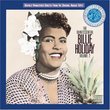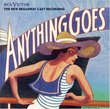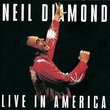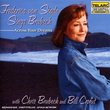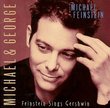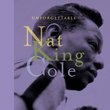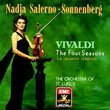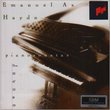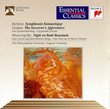| All Artists: Frank Guarrera, Giuseppe Valdengo, Giuseppe Verdi, Arturo Toscanini, Cloe Elmo, Nan Merriman, NBC Symphony Orchestra, Herva Nelli, Teresa Stich-Randall, Antonio Madasi, Gabor Carelli, John Carmen Rossi Title: Arturo Toscanini, Vol 12 - Verdi: Falstaff Members Wishing: 0 Total Copies: 0 Label: RCA Original Release Date: 1/1/2000 Re-Release Date: 4/18/2000 Album Type: Original recording remastered Genre: Classical Styles: Opera & Classical Vocal, Historical Periods, Modern, 20th, & 21st Century Number of Discs: 2 SwapaCD Credits: 2 Other Editions: Falstaff UPC: 743217237226 |
Search - Frank Guarrera, Giuseppe Valdengo, Giuseppe Verdi :: Arturo Toscanini, Vol 12 - Verdi: Falstaff
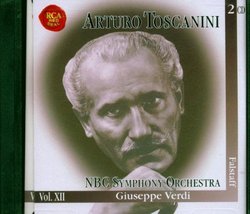 | Frank Guarrera, Giuseppe Valdengo, Giuseppe Verdi Arturo Toscanini, Vol 12 - Verdi: Falstaff Genre: Classical
According to Toscanini's biographer Harvey Sachs, the Maestro viewed Falstaff as the most successful marriage of words and music in the history of the lyric theater. The same can be said about his 1950 NBC broadcast perfor... more » |
Larger Image |
CD DetailsSynopsis
Amazon.com essential recording According to Toscanini's biographer Harvey Sachs, the Maestro viewed Falstaff as the most successful marriage of words and music in the history of the lyric theater. The same can be said about his 1950 NBC broadcast performance of Verdi's final opera. Karajan's EMI traversal from the '50s has the advantage of stereo and stronger solo singers, yet Toscanini achieves a remarkable synergy among pit, stage, and text that honors the composer's ensemble values with heartfelt brilliance at every turn. The orchestra not only sings: it talks, weaving incisive yet never obtrusive commentary around the vocalists, while sailing effortlessly through a maze of mood and tempo changes. By all accounts, Toscanini coached his cast to the extreme, and it shows. The excellent mono recording is well-balanced and still vivid after all these years. If I had to choose but one recording to demonstrate Toscanini's unique artistry, it would be this. --Jed Distler Similarly Requested CDs
|
CD ReviewsNobody does it better Marmez1@aol.com | Los Angeles, CA USA | 02/06/2000 (5 out of 5 stars) "First, let me make it clear that I love this opera from the time I first heard it on LP as a teenager. I have seen it performed several times and have viewed all the available videos. If you are reading this review, chances are you know the opera at least somewhat. Some of the things I love about the opera are the mixture of comic and tragic elements, the continuous flow of music and plot (in contrast to the more episodic style of Verdi's middle period), and the range of vocal textures the opera permits and requires. For my money, no one understood this opera as well as Toscanini. Perhaps only Guiseppe Valdengo and Teresa Stich-Randall were truly world class singers, but the cast blends extremely well. This is an opera performance in which ensemble singing supercedes individual arias. Of course, Robert Shaw's choral forces are first rate, as always. But it is the energy and propulsion of Toscanini that makes this version soar. None of the other versions, admittedly excellent also, capture the thrust and forward movement of this one. The sound transfer is pretty good for a mono opera recording of 1950. While it is not as sonically satisfying as some of the more modern versions, the musical interpretation is without peer. For those who want a modern stereo version, my preference is for Guilini. Bernstein's version has erratic tempos, Karajan's has great singers but just doesn't jell for me, Solti's is also pretty good, especially his Falstaff, but none matches the depth and understanding of Toscanini." Good, but not great madamemusico | Cincinnati, Ohio USA | 10/07/2000 (2 out of 5 stars) "Here we have one of those choices between great sound and great performance. This 1950 broadcast is wonderful, yes, but there is little humor in the performance; only Cloe Elmo as Dame Quickly sounds like she's having any fun. On the other hand, the astounding 1937 Salzburg performance--now newly-remastered with quite acceptable sound (see: Toscanini - The Salzburg Experience, Vol. 4, Falstaff)--has life, wit and whimsy along with outstanding singing. Also, Dino Borgioli, the Fenton on the Salzburg set, is the best on records, while the singer in this 1950 performance is quite terrible.If you want a good performance you will listen to a few times, buy this version. If you want a timeless performance that will reveal new hidden beauties every time you put it on, spend the extra $10 for the "Salzburg Experience."" Brings Back Memories Howard G Brown | Port St. Lucie, FL USA | 01/28/2002 (5 out of 5 stars) "While not a knee-jerk Toscanini fan, I am a great fan of this recording. It reminds me of my childhood, hearing Met broadcasts on a good radio -- AM, yes; mono, yes; but with a firm tone and just enough warmth to invite one to stick around for the broadcast. This recording is my benchmark for Falstaff."
|

 Track Listings (24) - Disc #1
Track Listings (24) - Disc #1![Vivaldi's Ring of Mystery [With CD]](https://nationalbookswap.com/cd//m/30/0730/80730.jpg)
